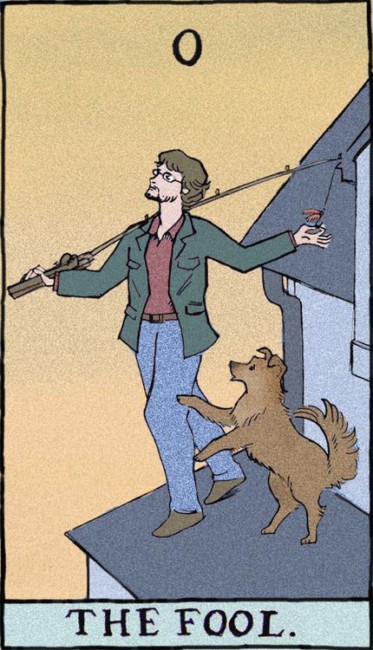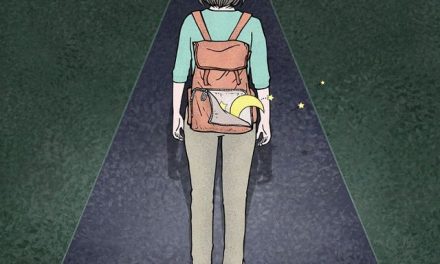
After disavowing Christianity, I started smoking a lot of pot and listening to the Beatles. Within You, Without You and Tomorrow Never Knows brought me my first taste of Eastern spirituality.
By John Author
Dana asked me, “How did you get into Buddhism?” The short answer is, “Curiosity.”
It was a burning, insatiable need to understand everything in the universe, to answer every question without compromise or good enoughs.
If curiosity is the function of Prajna, then I’ve been overflowing with Prajna my entire life. I was the annoying, “Why?” kid who exasperated his parents and annoyed his teachers. I used to play a game where I’d ask, “Why?” give an answer and then ask, “why?” again. I’d do that until I ran out of answers until there was a giant WHY in my mind that shoved out everything else. I think I was nine or so when I played that game.
I was a really weird kid—a weird kid on the Pratyekabuddha Path (the “Rhinoceros” Path) having found no solidarity with my peers. They wanted to do, I wanted to watch.
Curiosity is what eventually turned me against the establishment as well; it sparked the fires of civil disobedience. When an answer seemed to involve circular reasoning or if it was a blatant cop-out, I’d act out and lose respect for whomever gave me the “answer.” Fortunately, I’m quite the charmer, so I only wound up in the principal’s office one time.
Curiosity would have gotten me excommunicated from the Catholic church if my priest hadn’t moved away first. I’ve actually thought about writing a letter to the dioceses stating my current views so that they’ll take me out of their census. But, my mom’s still a Catholic, so I’ll just let it slide.
Prajna shattered my belief in hell. It didn’t make any sense to me: an all loving Father sending his children to suffer for all eternity. That inquiry led me to question God’s existence altogether.
After disavowing Christianity, I started smoking a lot of pot and listening to the Beatles. Within You, Without You and Tomorrow Never Knows brought me my first taste of Eastern spirituality. I immediately bought a copy of the Upanishads, and I was totally blown away. If it weren’t for weed and the Beatles, I probably wouldn’t be here writing this right now. Actually, this has turned into some kind of autobiography because all if it brought me to where I am now, to Buddhism, to you. And I’m glad to know you, Reader, and I appreciate you.
Even though I loved Vedanta, the questions wouldn’t stop. Prajna is great at depriving us of existential satisfaction. So I kept going. I touched on Buddhism a little bit, but the Western translations were just too fatalistic for me at the time. I was already a hormonal and existentially depressed teenager; I didn’t need all that, “Life is suffering,” stuff on top of it.
At around 17, I crossed Thoreau’s transcendentalist bridge from religion into Western philosophy. I was really into Stoicism for awhile; it’s the closest thing Western philosophy has to Zen. That eventually brought me to the Alan Watts’ book The Taboo Against Knowing Who You Are. I didn’t know anything about Alan at the time; I didn’t have a clue about his Zen leanings.
After that, I sloughed off all of it. I decided that everyone was full of crap, so I became a die-hard atheist and hailed the all-powerful Lord Science. That brought me into my early 20s, through broadcasting school and through the psychology Bachelor’s program.
I was really freaking miserable the entire time, but I was unaware of that fact. I was cynical, condescending, and my personal philosophy orbited somewhere around various flavors of nihilism. And psychology, even though I loved it, seemed to be missing something. Eventually, the insight struck me that reality is totally dependent on the mind—on perspective. So if I wanted to escape depression and anxiety, I had to change my perspective. That’s when an astonishingly arbitrary event changed the entire course of my life.
Four years ago, I was watching the show Life which starred a Zen Buddhist detective. I loved his character, and the little pop Buddhist lessons he listened to on a cassette tape really moved me. He read a book called The Path to Zen in the show. I searched for it, but it turns out that it isn’t a real book.
Instead, I found Taking the Path of Zen by Robert Aitken and that was that, I was swallowed by the Buddhadharma. There was the missing piece that psychology was looking for, there was the perspective I could choose that would alleviate suffering.
From there I surfed to Zen Mind, Beginners Mind then onward to the Diamond Sutra and Heart Sutra. Each page felt like it fell out of my own mind. It was beautiful, invigorating and awe-inspiring. Those texts fostered an explosion in my mind that pushed me to devour dozens of suttas and sutras.
During that time, I joined the Treeleaf Sangha, a virtual Zendo founded by Jundo Cohen. I won’t go into the specifics of what transpired. I’ll just say that I don’t recommend them. Then I studied with a teacher from the Boundless Way sect. That ended in utter disaster with a second teacher tossing me out.
It’s a special kind of agony when your teacher kicks you to the curb while you’re smack dab in the middle of something. I went a little mad after that (my madness is well documented in some of the articles I’ve written here).
I flailed for a long time, departing Zen for awhile to tour the other branches of Buddhism. I studied with a Vajrayana teacher, an awesome guy who helped me through that turbulent time. But, Vajrayana just isn’t for me. I also had a love affair with Advaita Vedanta and Taoism, but I’ve never strayed from the Buddhasphere.
After a year of flailing, I finally re-read the Platform Sutra; I was thunderstruck. Something about it sung to me; it was piercing the cloud of confusion I’d surrounded myself with and compelling me to head back to my roots: Zen. Actually, Caodong Ch’an this time, the Chinese counterpart of Soto Zen.
Now I’m a student in the Empty Cloud Sangha and recently took Refuge with my teacher, Shi Zhao Dao. He gave me the Dharma name Feng Dao, which means Wind Way or Wild Way. I sought a Dharma name ever since I set foot on the Path. The funny thing is that I didn’t get one until I finally hung up my seeking shoes and no longer desired one.
I’m still curious, but it’s different now. My curiosity is no longer a raging inferno; it isn’t a fire at all. Prajna doesn’t call me forward anymore; it moves me forward. It’s like a breeze that takes me wherever it will, and I no longer yearn to control it nor have any particular destination in mind. This is trust— trusting in the Dharma, trusting the Way. When the Dharma proves itself reliable when it comes to the obvious issues, then trust takes you through the subtle landscapes and un-mapped terrains.
Prajna is holding up a question and trusting that there’s an answer. Prajnaparamita is holding up an answer and trusting that there’s a question.
All of this is what brought me to Buddhism, and more than this as well. Every action in my entire life, every step I’ve ever taken; every thought, feeling, and experience were steps along a Path that I didn’t even know I was on.
Photo: (source)
Editor: Dana Gornall
Comments
- Bending Minds and Dogmatic Slumbers: Psychedelic Buddhism - April 1, 2024
- Political Animals: Should Buddhists Be Openly Political? - March 7, 2024
- Why Is Buddhism So Messy? - January 17, 2024





Nice to hear your journey. Alan Watts opened the way for so many.